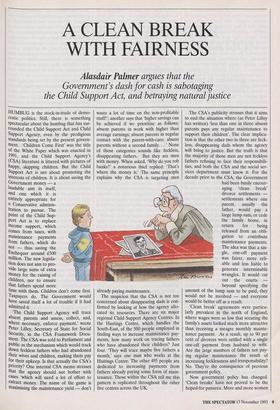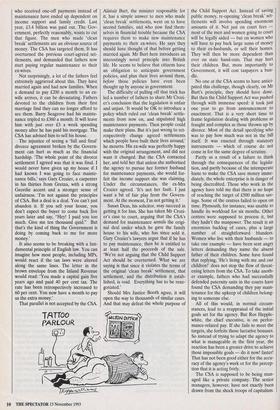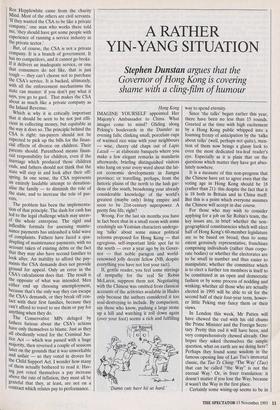A CLEAN BREAK WITH FAIRNESS
Government's dash for cash is sabotaging the Child Support Act, and betraying natural justice
'The Child Support Agency will trace absent parents and assess, collect, and, Where necessary, enforce payment,' wrote Peter Lilley, Secretary of State for Social Security, in the CSA Framework Docu- ment. The CSA was sold to Parliament and Public as the mechanism which would track down feckless fathers who had abandoned their wives and children, making them pay for their upkeep. Is that actually the CSA's Priority? One internal CSA memo stresses that the agency should not bother with cases 'which will need a lot of effort to extract money. The name of the game is maximising the maintenance yield — don't waste a lot of time on the non-profitable stuff!'; another says that 'higher savings can be achieved if we prioritise as follows: absent parents in work with higher than average earnings; absent parents in regular contact with the parent-with-care; absent parents without a second family. ' None of those categories sounds like feckless, disappearing fathers. But they are men with money. When asked, 'Why do you rob banks?' a notorious thief replied: 'That's where the money is.' The same principle explains why the CSA is targeting men already paying maintenance. The suspicion that the CSA is not too concerned about disappearing dads is con- firmed by looking at how the agency allo- cated its resources. There are six major regional Child Support Agency Centres. In the Hastings Centre, which handles the South-East, of the 500 people employed in finding ways to increase maintenance pay- ments, how many work on tracing fathers who have abandoned their children? Just four. 'They will trace maybe five fathers a month,' says one man who works at the Hastings Centre. The other 495 people are dedicated to increasing payments from fathers already paying some form of main- tenance. Those within the CSA tell me this pattern is replicated throughout the other five centres across the UK. 'Clean break' agreements were particu- larly prevalent in the north of England, where wages were so low that securing the family's assets looked much more attractive than receiving a meagre monthly mainte- nance payment. As a result, up to 90 per cent of divorces were settled with a single one-off payment from husband to wife. Are the large numbers of fathers not pay- ing regular maintenance the result of increasing fecklessness and irresponsibility? No. They're the consequence of previous government policy.
Now government policy has changed. 'Clean breaks' have not proved to be the hoped-for panacea. More and more women who received one-off payments instead of maintenance have ended up dependent on income support and family credit. Last year, £3.4 billion was paid out. The Gov- ernment, perfectly reasonably, wants to cut that figure. The men who made 'clean break' settlements are an obvious source of money. The CSA has targeted them. It has overturned the previous court-agreed set- tlements, and demanded that fathers now start paying regular maintenance to their ex-wives.
Not surprisingly, a lot of the fathers feel extremely aggrieved about this. They have married again and had new families. When a demand to pay £200 a month to an ex- wife arrives, it can be devastating. Fathers devoted to the children from their first marriage find they can no longer afford to see them. Barry Seagrove had his mainte- nance tripled to £360 a month. It will leave him with just over £3 a week spending money after he has paid his mortgage. The CSA has advised him to sell his house.
The injustice of seeing a 'full and final' divorce agreement broken by the Govern- ment can hurt as much as the financial hardship. 'The whole point of the divorce settlement I agreed was that it was final. I would never have given up my house if I had known I was going to face mainte- nance bills,' says Gary Crozier, a carpenter in his thirties from Gretna, with a strong Geordie accent and a stronger sense of unfairness. 'I'm not against the principles of CSA. But a deal is a deal. You can't just abandon it. If you sell your house, you don't expect the buyer to come back five years later and say, "Hey! I paid you too much. Give me ten thousand quid." But that's the kind of thing the Government is doing by coming back to me for more money.'
It also seems to be breaking with a fun- damental principle of English law. You can imagine how most people, including MPs, would react if the tax laws were altered along the same lines. The letter in the brown envelope from the Inland Revenue would read: 'You made a capital gain five years ago and paid 40 per cent tax. The rate has been retrospectively increased to 60 per cent. You now have a month to pay us the extra money.'
That parallel is not accepted by the CSA. Alistair Burt, the minister responsible for it, has a simple answer to men who made 'clean break' settlements, went on to have second families, and who now find them- selves in financial trouble because the CSA requires them to make new maintenance payments to their ex-wives. He says they should have thought of that before getting married again. Mr Burt here introduces an interestingly novel principle into British life. He seems to believe that citizens have an obligation to anticipate government policies, and plan their lives around them, before those policies have even been thought up by anyone in government.
The difficulty of pulling off that trick has led a number of fathers to share Mr Crozi- er's conclusion that the legislation is unfair and unjust. 'It would be OK to introduce a policy which ruled out 'clean break' settle- ments from now on, and stipulated high maintenance payments. Then people could make their plans. But it's just wrong to ret- rospectively change agreed settlements which people have built their lives around,' he mourns. His ex-wife was perfectly happy with the original arrangement, and did not want it changed. But the CSA contacted her, and told her that unless she authorised the agency to pursue her former husband for maintenance payments, she would for- feit the income support she was claiming. Under the circumstances, the ex-Mrs Crozier agreed. 'It's not her fault. I just want a bit of fair play from the Govern- ment. At the moment, I'm not getting it.'
Susan Deas, his solicitor, may succeed in getting it for him. She has taken Mr Crozi- er's case to court, arguing that the CSA's demand for maintenance annuls the origi- nal deal under which he gave the family house to his wife, who has since sold it. Gary Crozier's lawyers argue that if he has to pay maintenance, then he is entitled to at least half the proceeds of the sale. 'We're not arguing that the Child Support Act should be overturned. What we are saying is that since it violates the terms of the original 'clean break' settlement, that settlement, and the distribution it estab- lished, is void. Everything has to be rene- gotiated.'
Should Mrs Justice Booth agree, it will open the way to thousands of similar cases. And that may defeat the whole purpose of the Child Support Act. Instead of saving public money, re-opening 'clean break' set- tlements will involve spending enormous amounts of it. Not just on court fees — most of the men and women going to court will be legally aided — but on women who will have to pay back large sums of money to their ex-husbands, or sell their homes. They will then be more dependent than ever on state hand-outs. That may hurt their children. But, more importantly to Government, it will cost taxpayers a bun- dle.
No one at the CSA seems to have antici- pated this challenge, though clearly, on Mr Burt's principle, they should have done. But then the Child Support Act was pushed through with immense speed: it took just one year to go from announcement to enactment. That is a very short time to frame legislation dealing with problems as fraught and complex as those thrown up by divorce. Most of the detail specifying who was to pay how much was not in the bill itself. It was enacted through statutory instruments — which of course do not come in for the same degree of scrutiny.
Partly as a result of a failure to think through the consequences of the legisla- tion, and partly because of the intemperate haste to make the CSA save money imme- diately, the whole enterprise is in danger of being discredited. Those who work in the agency have told me that there is no hope of reaching the target of £500 million sav- ings. Some of the centres failed to open on time. Plymouth, for instance, was unable to handle its workload for six months. Other centres were supposed to process it, but they hadn't the manpower. The result is an enormous backlog of cases, plus a large number of straightforward blunders. Women who live with their husbands — to take one example — have been sent angry letters demanding they name the absent father of their children. Some have found that replying, 'He's living with me and our children!' does not stop the flow of threat- ening letters from the CSA. To take anoth- er example, fathers who had successfully defended paternity suits in the courts have found the CSA demanding they pay main- tenance for the upkeep of children belong- ing to someone else.
All of this would, in normal circum- stances, lead to a reappraisal of the initial goals set for the agency. But Ros Hepple- white, the chief executive, is on perfor- mance-related pay. If she fails to meet the targets, she forfeits those lucrative bonuses. So instead of trying to adapt the agency to what is manageable in the first year, the reaction has been a greater drive to achieve those impossible goals — do it now! faster! That has not been good either for the accu- racy of the agency's work or for the percep- tion that it is acting fairly.
The CSA is supposed to be being man- aged like a private company. The senior managers, however, have not exactly been drawn from the shock troops of capitalism. Ros Hepplewhite came from the charity Mind. Most of the others are civil servants. If they wanted the CSA to be like a private company,' one man who works there told me, 'they should have got some people with experience of running a service industry in the private sector.'
But, of course, the CSA is not a private Company. It is a branch of government. It has no competitors, and it cannot go broke. If it delivers an inadequate service, or one that consumers do not like, that is just tough — they can't choose not to purchase the CSA's service. It is backed, ultimately, With all the enforcement mechanisms the state can muster: if you don't pay what it says, you go to gaol. That makes the CSA about as much like a private company as the Inland Revenue.
Which is why it is critically important that it should be seen to be not just effi- cient in collecting money, but equitable in the way it does so. The principle behind the CSA is right: tax-payers should not be expected to pick up the bills for the finan- cial effects of divorce on children. Their Parents should. Parenthood means finan- cial responsibility for children, even if the marriage which produced those children ends, and fathers should not think that the state will step in and look after their off- spring. In one sense, the CSA represents an entirely laudable attempt to denation- alise the family — to diminish the role of the state, and to increase the role of par- ents.
The problem has been the implementa- tion of that principle. The dash for cash has led to the legal challenge which may unrav- el the whole enterprise. The rigid and inflexible formula for assessing mainte- nance payments has unleashed a tidal wave of complaints. Fathers have faced a qua- drupling of maintenance payments, with no account taken of existing debts or the fact that they may also have second families to look after. An inability to afford the pay- ments the CSA demands does not provide ground for appeal. Only an error in the CSA's calculations does that. The result is the opposite of what was intended. Men either end up choosing unemployment, because that's the only way they can escape the CSA's demands, or they break off con- tact with their first families, because they can't afford to travel to see them or pay for anything when they do. The Conservative MPs deluged by fathers furious about the CSA's actions have only themselves to blame. Just as they all obediently voted for the Criminal Jus- tice Act — which was passed with a huge majority, then reversed a couple of sessions later on the grounds that it was unworkable and unfair — so they voted in droves for the Child Support Act. I wonder how many 9f them actually bothered to read it. Hav- ing just voted themselves a pay increase above the rate of inflation, they must all be grateful that they, at least, are not on a contract which relates pay to performance.




























































 Previous page
Previous page